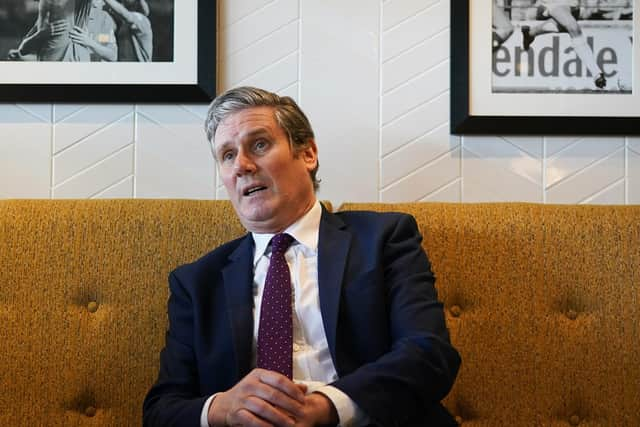Keir Starmer has no chance of becoming Prime Minister if he does not stamp out ignorant anti-business rhetoric - Mark Casci
The right to peacefully protest is being wilfully eroded with legislation one would expect from an authoritarian regime.
And taxpayer money has been frittered away on a Downing Street media briefing room that the expression ‘vanity exercise’ was built for.
Advertisement
Hide AdAdvertisement
Hide AdGiven all of these facts you would expect the Government of the day to be deeply unpopular, and for the opposition to be riding high in the polls.


Except this has not happened. One year into Keir Starmer’s leadership of the Labour Party, his standing with voters remains average at best, and significantly behind that of the Prime Minister.
Latest polling from YouGov reveals that things started to take a turn for the worse for Starmer in late January. As of the end of last week, Starmer’s net favourability score stands at -11, his second worst showing to date.
Rumours abound that a reshuffle of the shadow cabinet could be in the offing, with shadow chancellor Anneliese Dodds apparently in line to be replaced, possibly by Leeds West MP Rachel Reeves. While it is true that Dodds has been unimpressive in the shadow chancellor brief I cannot help but think that the reasons for Labour’s unpopularity under Starmer lies closer to home.
Advertisement
Hide AdAdvertisement
Hide AdA perfect example of this came with his reaction when his shadow tourism minister and Leeds North West MP Alex Sobel described business as being “the enemy”.


Sobel, when speaking about his work with businesses to tackle climate change, said: “When I first became an MP, I was like, I am not taking meetings with any of these people. These people are the enemy, you know.
“I’m a socialist, my job is to effectively transform society so that we have a much more mixed economy and we don’t have huge global corporations which have all this power.”
The words evoke memories of a certain Boris Johnson who remarked “f*** business” while foreign secretary and continue a trend of negative commentary from the political class when it comes to our economic leaders.
Advertisement
Hide AdAdvertisement
Hide AdFor the entirety of the interminable Brexit debate the voices of business were ignored and vilified. And while the last five years have questioned the Tories’ long-held mantle of being the part of business, Labour has in its own way been along for the ride.
Sobel’s remarks however, aside from being crass and combative, are all too common amongst the for now bowed but still too pervasive hard left of Labour. Moreover the notion that Britain’s business community is essence run and controlled by an all-powerful cabal of massive corporate titans is just wrong.
Of Britain’s 5.9 million registered firms, 5.8 million of these businesses have less than 49 employees, some 99 per cent of the whole economy. Indeed, only 7,700 British businesses are home to 250 or more employees.
To suggest that these millions of small or medium-sized companies are somehow “the enemy” leads me to ask whose enemy exactly? Are they the enemy of the people they employ, the communities they serve or the customers who consume their technologies and services? Are they the enemies of the treasury and local authorities to whom they pay taxes and business rates?
Advertisement
Hide AdAdvertisement
Hide AdOr are they the figment of a hard left ideology, rooted in fantasy and used as a means to attack and demonise those who aspire to success?
The remarks drew a response from Starmer which I would characterise as half-hearted at best. He insisted that Labour was “very clearly pro-business”. Such lukewarm words will be of no comfort to the millions of voters ahead of the upcoming elections in May who may be fearful the dismal failure of the Corbyn years have been consigned to history.
If Starmer wants to reverse his increasing unpopularity and to be seen as a credible potential occupant of Number 10, he needs to go further than weakly admonishing Sobel for his foolish remarks and have him removed from the shadow ministerial position.
No-one has ever been elected Prime Minister with an anti-business image.
Starmer would do well to bear this in mind.